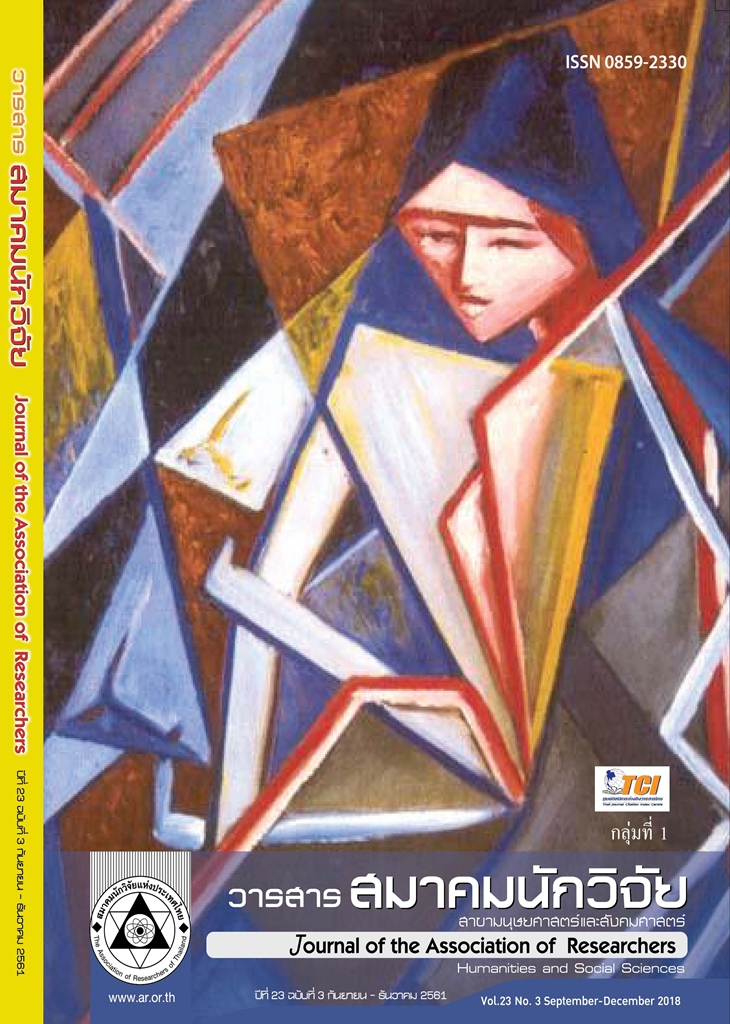Causal of Digital Marketing Influencing Hotel Customers’ Satisfaction and Loyalty in the Andaman Triangle Cluster, Thailand
Main Article Content
Abstract
The purpose of this quantitative research was to examine the influence of two main factors; digital marketing and perceived value towards hotel customers’ satisfaction and loyalty. These two factors have been used by hotels as part of their marketing strategies to improve their customers’ satisfaction and loyalty. The sample population of this research consisted of 750 customers, who booked their rooms and services through online media channels with the hotels located in the Andaman triangle provinces (Phuket, Phang-Nga and Krabi). The research instrument was the self-administrative questionnaires both in Thai and English languages, which were given to the hotels’ customers on face–to-face basis and the information was then systematically collected from these customers. Using techniques of descriptive statistics, the collected data were analyzed in terms of mean, standard deviation, skewness and kurtosis. In addition, inferential statistics with Pearson’s product moment correlation coefficient method and structural equation modeling (SEM) techniques were used to test the research hypotheses. Data were analyzed using Statistical Package for Social Science Software (SPSS) and Linear Structural Relations (LISREL) computer software programs. The causal study was found to be congruent with empirical data at a very good level in all hypotheses. In carrying out hypothesis testing, the researcher has concluded the following: (1) most customers were men ages between 26-41 years old with monthly income between 50,000 and 150,000. They were mostly educated couple travelers with bachelor degree from Europe (such as Sweden, Scandinavia, France, etc.), Malaysia and Singapore working in the private companies. They travel between 1-2 times a year, stay in the hotel within 1-5 days and booked their rooms through online travel agent (OTA), (2) website marketing can influence the hotel’s customers to perceive the value of services of the hotel significantly (3) social media marketing and content marketing can directly influence the customers’ loyalty on the services of the hotel (4) website marketing can influence the customers’ satisfaction and loyalty, once the customers have perceived the value of services of the hotel (5) the customers’ satisfaction can result to the customers’ loyalty significantly. Therefore, the results can be summarized that the digital marketing and perceived value factors have direct and indirect influence towards the customers’ satisfaction and loyalty significantly.
Article Details
บทความที่ปรากฏในวารสารนี้ เป็นความรับผิดชอบของผู้เขียน ซึ่งสมาคมนักวิจัยไม่จำเป็นต้องเห็นด้วยเสมอไป การนำเสนอผลงานวิจัยและบทความในวารสารนี้ไปเผยแพร่สามารถกระทำได้ โดยระบุแหล่งอ้างอิงจาก "วารสารสมาคมนักวิจัย"
References
ฉลองศรี พิมลสมพงศ์. (2544). การวางแผนและพัฒนาตลาดการท่องเที่ยว. กรุงเทพฯ: มหาวิทยาลัยเกษตรศาสตร์.
ปัณณวัชร์ พัชราวลัย. (2559). ความพึงพอใจต่อคุณภาพการบริการ และการรับรู้ภาพลักษณ์ธนาคารเฉพาะกิจ ที่ส่งผลต่อ ความภักดีในการใช้บริการของประชาชนในเขตกรุงเทพมหานคร. กรุงเทพฯ: มหาวิทยาลัยกรุงเทพ.
ภัทรวดี เหรียญมณี. (2558). การสื่อสารทางการตลาดแบบบูรณาการผ่านสื่อดิจิทัลที่ส่งผลต่อการตัดสินใจใช้ บริการค่าย มวยเพื่อการออกกําลังกายในเขตกรุงเทพมหานคร. กรุงเทพฯ: มหาวิทยาลัยกรุงเทพ.
ศูนย์พัฒนาพาณิชย์อิเล็กทรอนิกส์. (2552). E-Commerce for Sustainable Economy Development
สกุลทิพย์ โยธินนรธรรรม. (2558). อิทธิพลของคุณค่าที่รับรู้ และคุณภาพการให้บริการ ที่มีต่อความไว้เนื้อเชื่อใจ ความพึง พอใจ และการกลับมาบริโภคซํ้าของผู้บริโภคอาหารญี่ปุ่นในร้าน Oishi Grand. กรุงเทพฯ: มหาวิทยาลัยกรุงเทพ.
สุรมน ไทยเกษม, ช่วงโชติ พันธุเวช และพงษ์ หรดา. (2554). บุพปัจจัยที่ส่งผลต่อความจงรักภักดีของลูกค้าผู้ใช้ธนาคาร พาณิชย์. วารสารสมาคมนักวิจัย 16(2), 55-67. อุไรพร ชลสิริรุ่งสกุล. (2554). Digital Marketing ไอเดียปฏิวัติการตลาด. กรุงเทพฯ: กรุงเทพธุรกิจ.
References
Assael, H. (1995). Consumer behavior and marketing action. Cincinnati, Ohio: South Western College. Balakrishnan, Bamini KPD, Mohd Irwan
Dahnil & Wong Jiunn Yi. (2014). The Impact of Social Media Marketing Medium Toward Purchase Intention and Brand Loyalty Among Generation Y. Procedia - Social and Behavioral Sciences, 148, 177 – 185.
Gale, B.T. (1994). Managing Customer Value: Creating Quality and Service That Customers Can See. The New York: Free Press.
Hinkle, D.E, William, W. and Stephen G. J. (1998). Applied Statistics for the Behavior Sciences. (4th ed.). New York: Houghton Mifflin. Kotler,
Philip. & Keller Kelvin Lane. (2016). Marketing management. Upper Saddle River, NJ: Prentice Hall. Monroe, K. (1990). Pricing: Making profitable decisions. New York: McGraw-Hill.
Morse, Nancy C. (1955). Satisfactions in the White-Collar Job. Michigan: University of Michigan.
Translated Thai References
Chalongsri Pimolsompong. (2001). Planning and developing tourism market. Bangkok: Kasetsart University. [in Thai].
Kedwadee Sombultawee, Jintajuta Yoothong and Chaunsiri Tammachard. (2016). The influence of social media in public relation on Maybelline brand awareness of female Gen Y in Bangkok. Narasaunvijai 12th, 1504-1514. [in Thai].
Patcharawalai, P. (2016). The Effect of Satisfaction with Service Quality and Image Perception of the Bank on Consumers’ Loyalty to Specialized Financial Institutions. Bangkok: Bangkok University. [in Thai].
Reanmanee, P. (2016). Digital Integrated Marketing Communication to Affecting the Service Boxing in Bangkok. Bangkok: Bangkok University. [in Thai].
Suramon Thaikasame, Chuangchote Bhuntuvech & Pong Horada. (2011). Antecedent factors effecting on customer loyalty of commercial bank users. Journal of the Association of Researchers. 16(2), 55-67.
Uraipon Chonsirirungsakul. (2011). Digital marketing- Idea for marketing revolution. Bangkok: Krungthepdhurakit. [in Thai]. Yothinnorratham, S. (2015). The Influences of perceived value and service quality on the trust, satisfaction and revisit of the Oishi Grand’s customers. Bangkok: Bangkok University. [in Thai].


